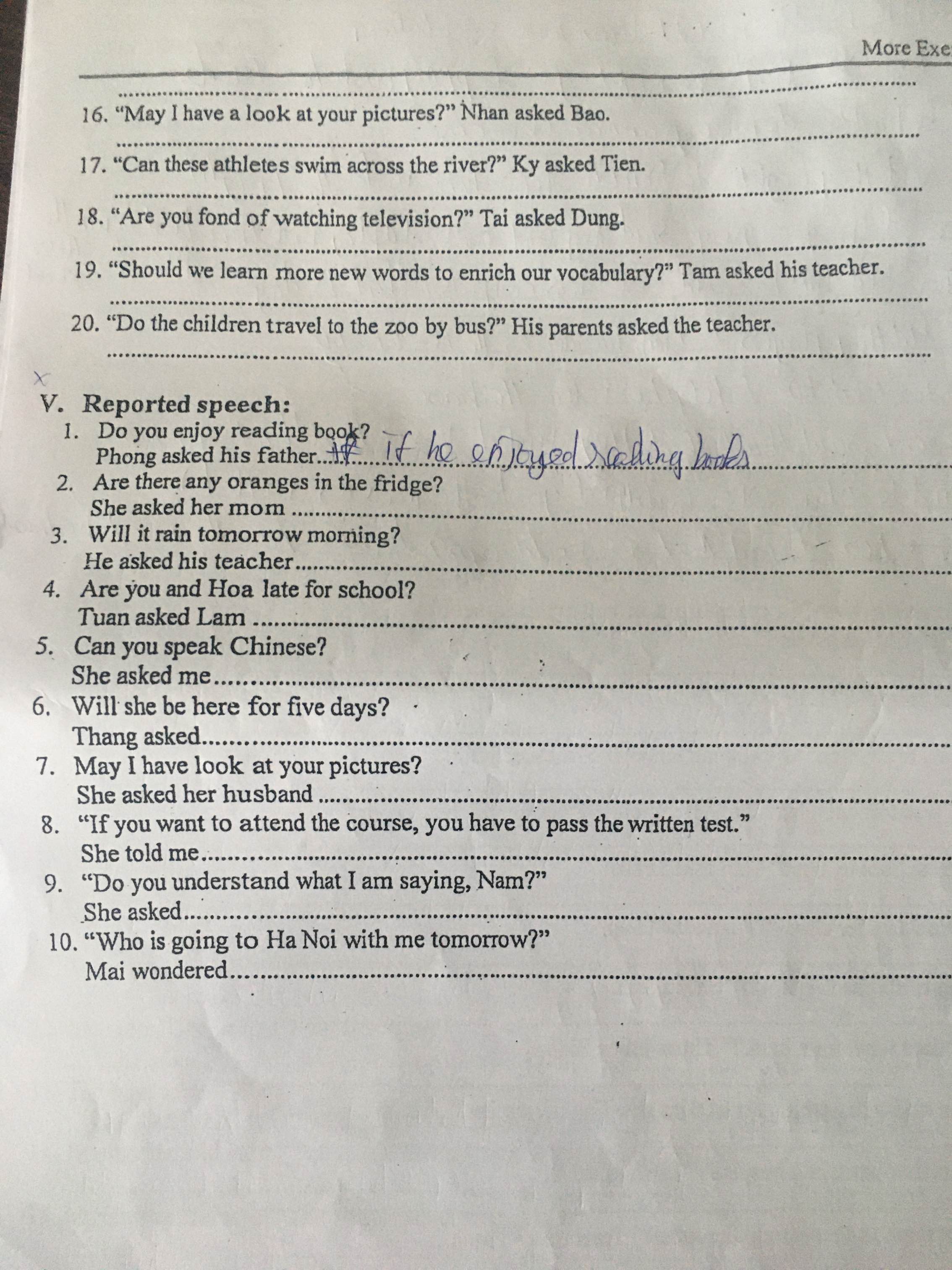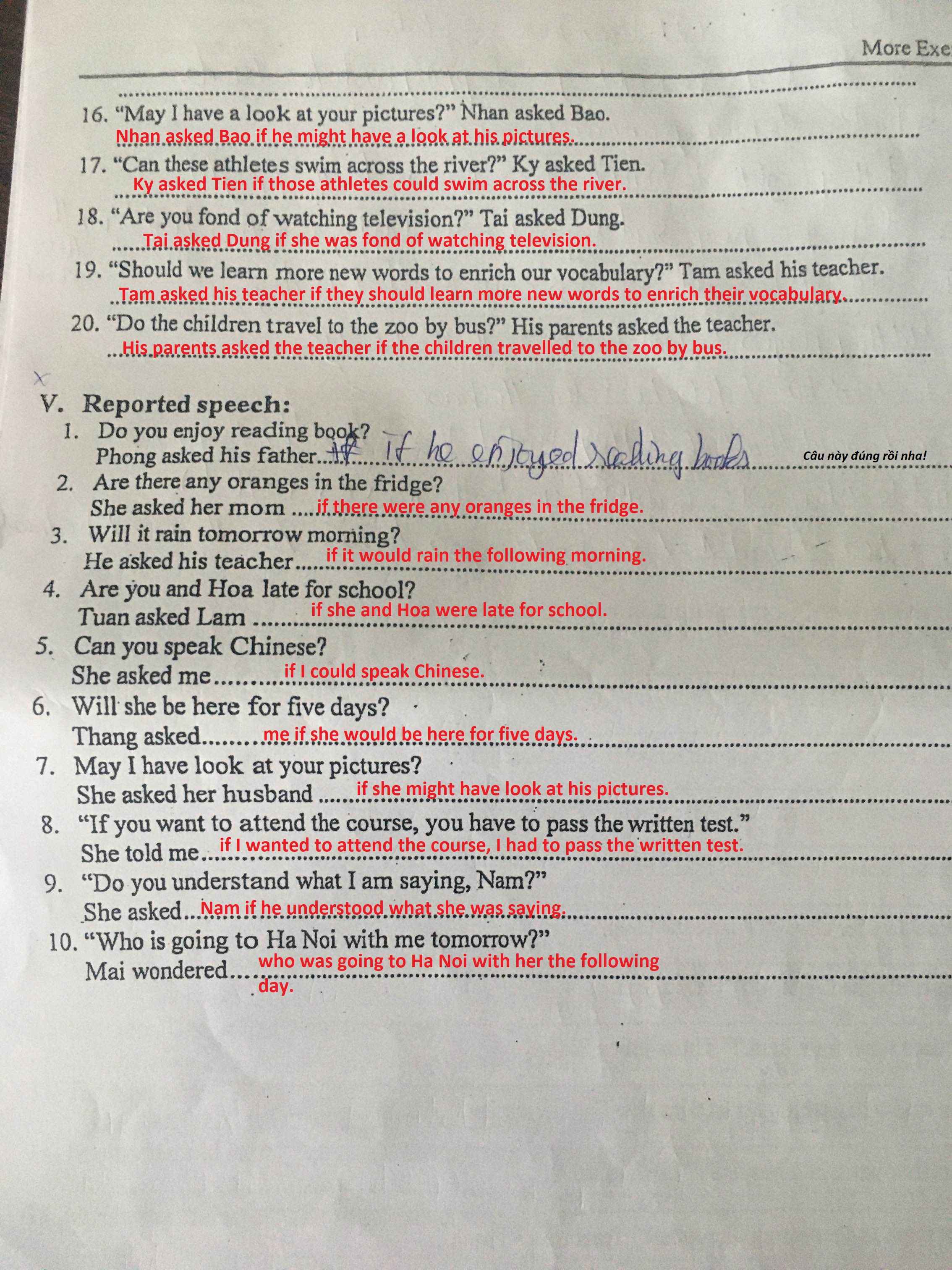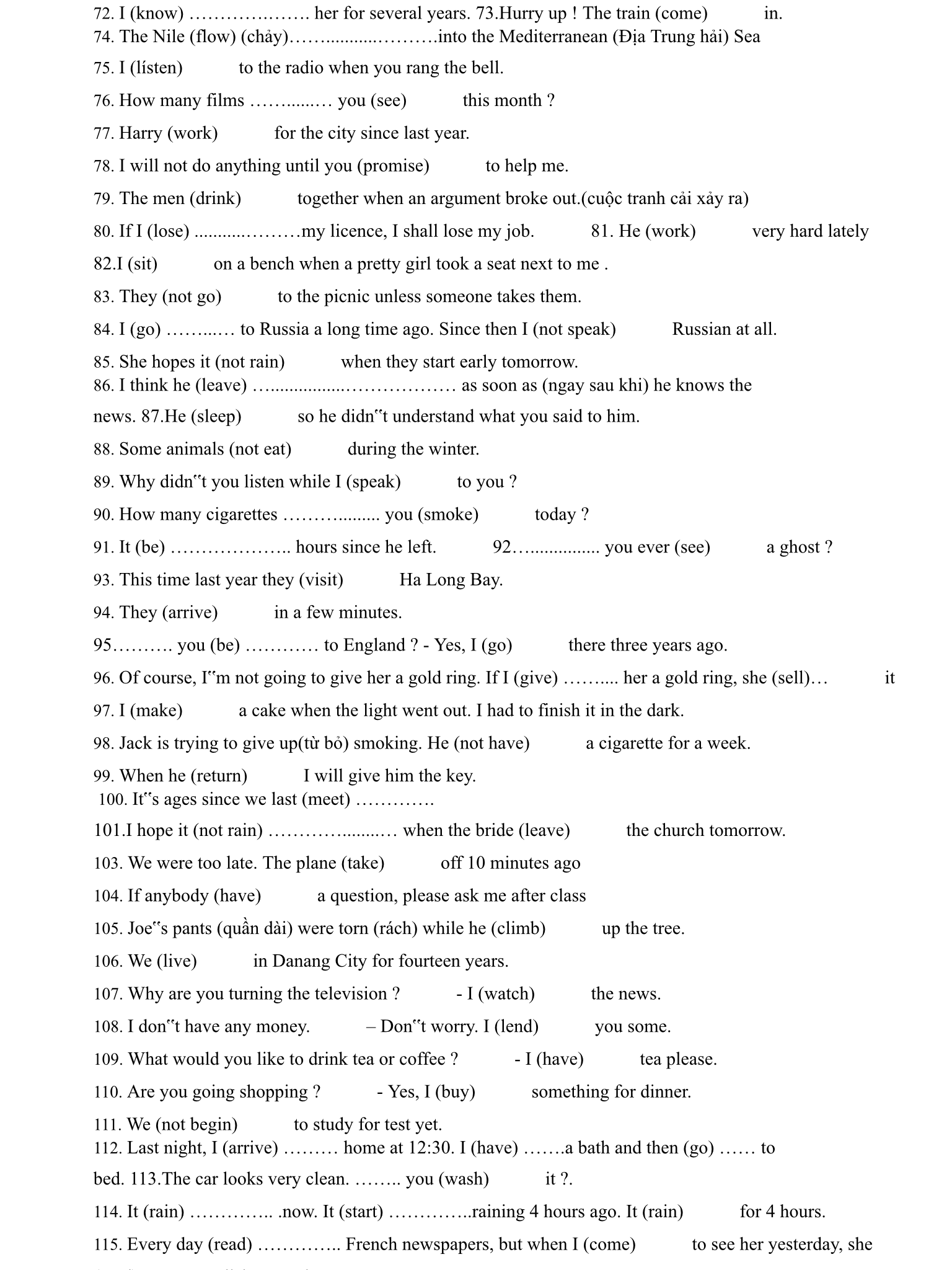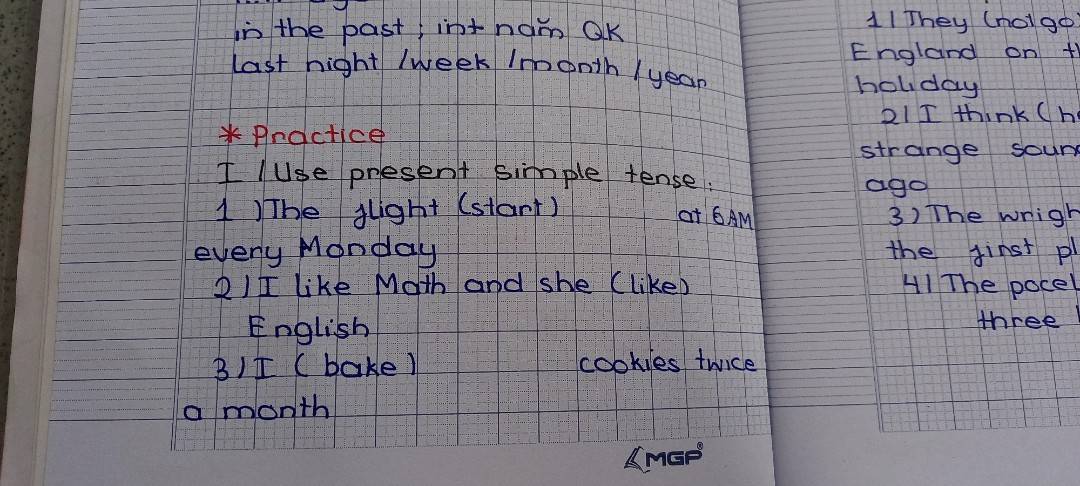
Hãy nhập câu hỏi của bạn vào đây, nếu là tài khoản VIP, bạn sẽ được ưu tiên trả lời.


1, born
2, and
3, in
4, On
5, During
6, for
7, came
8, played
9, At
10, with
1,It is dangerous to go out at night
2, Van isn't interested in travelling by plane
3, Hung acts well

72. have known
73. is coming
74. flows
75. was listening
76. did...see
77. worked
78. promise
79. was drinking
80. lost
81. has worked
82. was sitting
83. won't go
84. went - haven't speak
85. doesn't rain
86. leaved
87. was sleeping
88. don't eat
89. was speaking
90. did...smoke
91. has been
92. Have...seen
93. were visiting
94. arrived
95. Have...been - went
96. give - will sell
97. was making
98. hasn't had
99. returns
100. met
101. doesn't rain - left
103. took
104. has
105. was climbing
106. have lived
107. am going to watch
108. will lend
109. would have
110. am buying
111. haven't begun
112. arrived - had - went
113. Did...wash
114. is raining - started - has been raining
115. reading - come
Chúc bạn hoc tốt!

The Tay, with local groups Pa dí, Thổ, Ngan, Phén, Thu Lao, is an ethnic group of 54 ethnic groups in Viet Nam. Tay people speak Tay, a Tai dialect of the Tai-Kadai language. Tay people live mainly in lowland areas of northern Vietnam. The Tay was previously known as the Tho (although this name is now used to refer to a different ethnic group, see Turks). Tay people have the second largest population in Vietnam. Tay people, Nung have a close relationship with the Choang people in China.Tay people mainly reside in the northern midland and mountainous provinces (1,400,519 people in 1999). In addition, in the recent time, the Tay also migrated to some provinces in the Central Highlands like Dak Lak and Lam Dong.The Tay are usually at the foot of the mountain or along the stream. The name is often referred to by the name of hills, fields, rivers. Each village has 15 to 20 houses. Large villages divided into many small villages.Tay dressed in indigo. Traditional Tay costumes are made from self-made cotton yarn, dyed indigo on men's and women's clothes, almost without decorative pattern. Tay clothing can be considered one of the simplest outfits of 54 ethnic groups. The costume is simple but meaningful.Then singing, singing, singing sli are used in various activities, popular folk songs of the Tay. Musical instruments such as the Micro, Shake. Chess is an instrument that is present in all spiritual activities of the Tay, such as soul in the folk dance of the Tay. In this life, the sex acts as a means of communicating bold identity.Traditional houses are usually on stilts, lands and roofs with grass and some border areas have defense types. In the house to distinguish male rooms outside, women in the chamber. Most popular are 3-room, 2-roofed houses (no chop), logs of land or bushes, surrounding woods, roofs of grass, picturesque Tay people settle in groups of about 15 to 20 households. Tay people worship ancestors and animals. The Tay ancestors' altar is placed in the middle of the house and made into a private space and revered. Pregnant women and their newborns are not allowed to sit or lie on chairs or beds in front of the altar. In the Tay religion, the most important feast day of the Tay people is usually the last day of the lunar month.The life of the Tay is often associated with nature, so the food and foodstuff of the Tay people are products obtained from production activities in areas with forests, rivers, streams and hills surrounding. Some famous dishes are: sticky egg rolls, sticky rice balls, sour bamboo shoots, stigma.
The Tay, with local groups Pa dí, Thổ, Ngan, Phén, Thu Lao, is an ethnic group of 54 ethnic groups in Viet Nam. Tay people speak Tay, a Tai dialect of the Tai-Kadai language. Tay people live mainly in lowland areas of northern Vietnam. The Tay was previously known as the Tho (although this name is now used to refer to a different ethnic group, see Turks). Tay people have the second largest population in Vietnam. Tay people, Nung have a close relationship with the Choang people in China.Tay people mainly reside in the northern midland and mountainous provinces (1,400,519 people in 1999). In addition, in the recent time, the Tay also migrated to some provinces in the Central Highlands like Dak Lak and Lam Dong.The Tay are usually at the foot of the mountain or along the stream. The name is often referred to by the name of hills, fields, rivers. Each village has 15 to 20 houses. Large villages divided into many small villages.Tay dressed in indigo. Traditional Tay costumes are made from self-made cotton yarn, dyed indigo on men's and women's clothes, almost without decorative pattern. Tay clothing can be considered one of the simplest outfits of 54 ethnic groups. The costume is simple but meaningful.Then singing, singing, singing sli are used in various activities, popular folk songs of the Tay. Musical instruments such as the Micro, Shake. Chess is an instrument that is present in all spiritual activities of the Tay, such as soul in the folk dance of the Tay. In this life, the sex acts as a means of communicating bold identity.Traditional houses are usually on stilts, lands and roofs with grass and some border areas have defense types. In the house to distinguish male rooms outside, women in the chamber. Most popular are 3-room, 2-roofed houses (no chop), logs of land or bushes, surrounding woods, roofs of grass, picturesque Tay people settle in groups of about 15 to 20 households. Tay people worship ancestors and animals. The Tay ancestors' altar is placed in the middle of the house and made into a private space and revered. Pregnant women and their newborns are not allowed to sit or lie on chairs or beds in front of the altar. In the Tay religion, the most important feast day of the Tay people is usually the last day of the lunar month.The life of the Tay is often associated with nature, so the food and foodstuff of the Tay people are products obtained from production activities in areas with forests, rivers, streams and hills surrounding. Some famous dishes are: sticky egg rolls, sticky rice balls, sour bamboo shoots, stigma.
THAM KHẢO

1 I said my car had been stolen a few weeks before
2 He said his boss had arrived late the night before
3 We say we had to go there then
4 She said she would go to her village the next week
5 I asked him if I could drive his car






 Mấy bạn giải giúp mình bài này nha ~ Tại mình yếu phần mạo từ :3
Mấy bạn giải giúp mình bài này nha ~ Tại mình yếu phần mạo từ :3